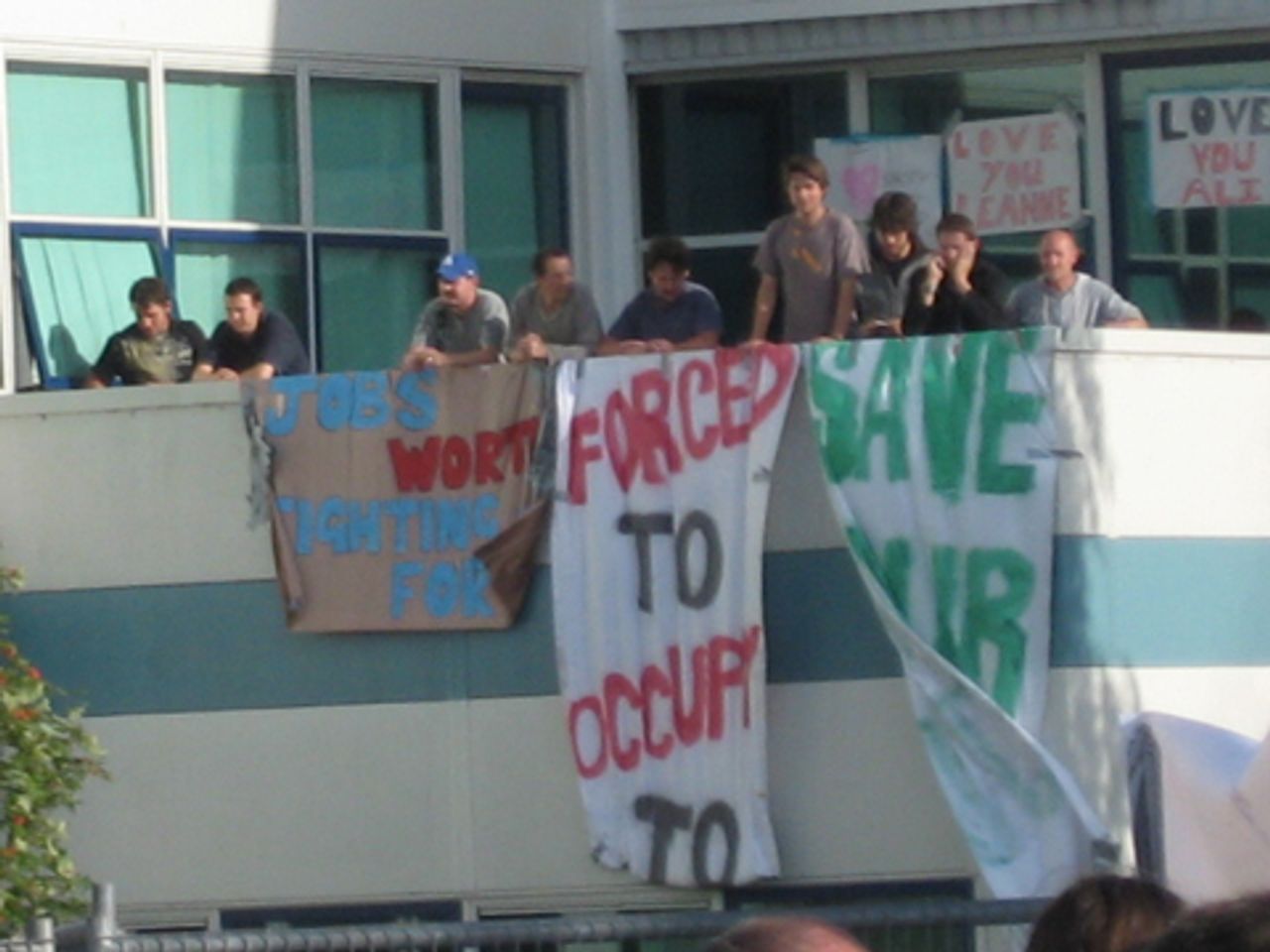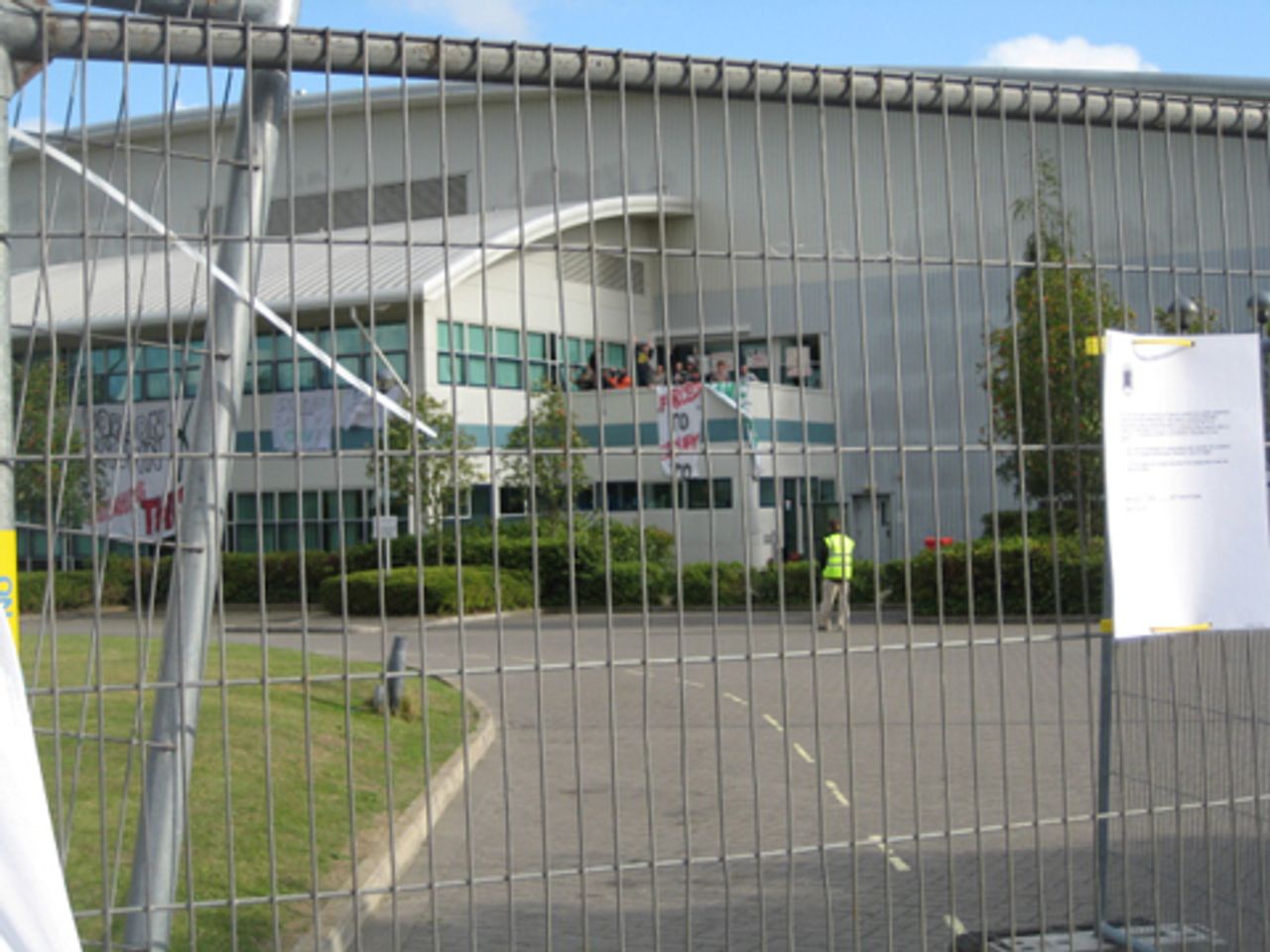Workers occupying the Vestas Blades wind turbine factory in Newport on the Isle of Wight have received a summons demanding they appear in court on Wednesday, July 29. A judge is due to consider the case and could order their forceful removal from the factory.
 Workers in occupation at the Vestas factory
Workers in occupation at the Vestas factorySome 25 workers began the sit-in on July 20 to oppose the closure of the plant, which is scheduled for July 31 with the loss of over 500 jobs. The company also plans to close another plant in Southampton employing 100 people.
Responding to the summons, occupation spokesman Steve Stotesbury called on supporters to lobby the court in Newport at 10 a.m. on that date so as to reject the demand by company spokesman Peter Kruse that “they might as well all pack and go home.”
Kruse threatened that while the company owners were “patient people,” the workers would face “consequences” if they continued their occupation. Reports suggest the company has said the workers have been sacked and will not be paid redundancies owed to them.
Kruse said most of wind turbine blades made at the plant were for the North American market and not for Europe.
“The Isle of Wight facility has not made a single blade for the UK. We thought about switching production to the UK, but there is not much demand for on-shore turbines here at present,” Kruse said, adding that any future demand in the UK would be met through the company’s other European sites.
Rallies were held outside the factory every day last week in support of the protesters, concluding with a 400-strong demonstration of Vestas workers, their families and supporters on Friday. They marched from Newport town centre, chanting “Save our Vestas, save the planet” and waving homemade banners to the occupied factory, which is surrounded by a two-metre-high fence erected by the company and patrolled by security guards and police officers.
 Fence surrounding Vestas factory
Fence surrounding Vestas factorySean McDonagh told reporters, “For so long, management kept us down; they’ve broken us and bullied us.
“To move up the ladder you had to do anything the management wanted. If you didn’t want to do that, they didn’t want to know. People were too scared to stand up for themselves, because they were worried they’d lose their jobs. It’s good money, and that’s really what the management has worked on.”
Mark Stringer, who had been in the occupation for the first few days, told the demonstrators, “I’ve got involved because I knew my chances of getting another job on the island were next to zero. I’ve got a family to feed. The atmosphere inside is one of solidarity.” He said conditions inside the factory were “adequate,” the workers’ morale was high and they “all sit down and talk [problems] through together.”
“Management tried to use bully boy and scare tactics, but after a while got the message that we are here to stay.”
 Steve Stotesbury
Steve StotesburyAfter the rally, Steve Stotesbury told the World Socialist Web Site that he had been “thrust” into becoming spokesman for the occupation and was trying to get messages from the occupying workers to the outside world.
He explained that he had “never ever” been involved in political action before and that “initially it was very daunting.... I knew it had to be done and have tried to give my all to this occupation,” he added.
“We had been talking about occupying the plant for some time. Then we just took the decision and said ‘Right, we’re going in.’”
Stotesbury continued, “The main gripe was the management style. It became very demoralising. They treated people like numbers on the balance sheet rather than the human beings they were.”
He explained that the occupiers had been summoned to appear before Newport County Court on Wednesday to “answer questions regarding possession of the factory” although they were still unsure if they had to appear in person.
The company blamed the decision to close the factory on the world recession and the harsh planning laws in the UK that made it impossible to build wind turbines, Stotesbury said. However, “I can’t understand why Vestas can’t be made viable given the government has promised to relax the planning laws.”
The response from the Labour government was an “absolute disgrace,” he went on, and it had been almost impossible to get Labour MPs to support the workers’ campaign.
No confidence in Labour
The Vestas occupation has called on the government to act on its pledges to mitigate the impact of the global financial crisis by championing the development of new “growth” sectors, particularly as regards renewable energy, and nationalise the plant.
In the same week that Vestas, the UK’s only wind turbine manufacturer, was closed, Energy Secretary Ed Miliband called for an “Apollo programme” of renewable energy and the creation of hundreds of thousands of new “green” jobs.
Miliband declared, “Forty years since the Eagle landed on the moon, the idea of a new Apollo project has become shorthand for how we should tackle climate change: politics forcing through the technological limits, a decade-long push, and a nation unified for a shared goal.”
On the basis of such pronouncements, the trade union bureaucracy and others are promoting the illusion that Labour can be made to listen to reason, and that workers’ interests can be defended without significant inroads into the capitalist market.
In a message of support for the Vestas occupation, Caroline Lucas, Green Party leader and Member of the European Parliament for the Isle of Wight, said, “The decision to close the facility represents a spectacular failure by government ministers to adequately promote green industries and protect the future of manufacturing in this country.”
She called on the government to make a “genuine start” in promoting renewable energy by “pledging financial aid to help keep the Isle of Wight’s Vestas plant open for business—and prove that its rhetoric on renewable energy is more than just hot air.”
The Rail, Maritime and Transport (RMT) trade union represents some of the workers at the otherwise non-union Isle of Wight plant and has said it will provide legal support for the court action.
Addressing a rally on Thursday, Bob Crow, RMT general secretary, said the Vestas workers “deserve the full support of the whole trade union movement.
“There’s a simple solution to this dispute,” he went on. “The government should nationalise the factory, protect the jobs and show that they are walking the talk when it comes to green and renewable energy.”
However, writing in the Guardian on the Vestas occupation, Miliband ruled out nationalisation, stating that the issue was to help “grow the market” in renewable energies, and that the government’s intended re-regulation of planning laws was a step towards this end.
The government has no intention of taking any measures that will thwart the profit interests of big business and the City of London. Billions have been handed out to the banks, and some even “nationalised,” but only with the purpose of allowing them to continue operating as private concerns at taxpayers’ expense.
At the same time, Labour has made clear that these monies will be recouped from the living standards of the working class. As unemployment reaches the 2.5 million mark, with shops, businesses and services closing every day, it has ruled out any genuine aid for those whose livelihoods are threatened.
In the meantime, there is no sign of Crow’s pledge of support from the “whole trade union movement.”
Friday’s protest was largely confined to the families of those affected. There has been no mobilisation of other unions in defence of the occupation, and no trade union banners were on the march.
The factory has been sealed off, with the police preventing those inside from receiving food from supporters. Now the company intends to use the law court to quash the occupation.
The Vestas occupation is at a crossroad. It is vital that lessons are learnt from other recent struggles that have been isolated and betrayed by the trade union bureaucracy—most notably that by workers at the Visteon car parts company.
In April, Visteon workers were summarily dismissed after the company went into administration. The company’s plant in Belfast was occupied, while pickets blocked factories in Enfield and Basildon to prevent equipment being removed.
The trade union bureaucracy did everything to isolate the dispute. There was no solidarity action organised amongst workers in auto plants and at other car suppliers that faced layoffs and short-time working.
Eventually the company conceded to an improved redundancy settlement for some of the workers. The trade unions claimed victory, and the occupation and pickets were called off. The increased redundancy terms did little to compensate the 600 workers and their families whose jobs were destroyed and, three months on, the redundant workers and former employees find they have lost the pensions they paid into for years.
The struggle by the Vestas workers can only be successful on the basis of escalating the class struggle against the company, the trade union bureaucracy and the Labour government.
This requires the mobilisation of the broadest sections of the working class and young people. The Socialist Equality Party calls for the plant and the energy industry as a whole to be nationalised under workers’ control, as part of the necessary struggle for the socialist re-organisation of economic life on the basis of social need, not private profit.
Subscribe to the IWA-RFC Newsletter
Get email updates on workers’ struggles and a global perspective from the International Workers Alliance of Rank-and-File Committees.
